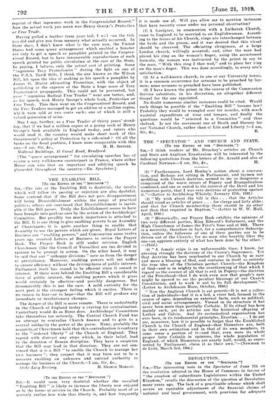THE " SPECTATOR " AND CHURCH AND STATE. {To THE
EDITOR OF THE " SPECTATOR.")'
Sza,—I think readers of Mr. Strachey's articles on Church and State and Anglican Erastianism will be interested by the following quotations from the letters of Dr. Arnold and also of Cardinal Newman.—I am, Sir, &c., (1) " Furthermore, Lord Henley's notion about a convoca- tion, and Bishops not sitting in Parliament, and laymen not Meddling with Church doctrine, seemed to me so dangerous a compound of the worst errors of Popery and Evangelicalism combined, and one so suited to the interest of the Devil and his numerous party, that I was very desirous of protesting against it."—(Letter to Archbishop Whately, January 17th, 1833.) (2) "My wish about the bill is this . . . that the Articles should stand as articles of peace . . . for clergy and laity alike; and that for Church membership there should be no other test than that required in Baptism."—(Letter to W. W. Hull, April, 1810.)
(3) " Historically, our Prayer Book exhibits the opinions of two very different parties, King Edward's Reformers, and the High Churchmen of James the First's time and of 1661. There is a necessity, therefore in fact, for a comprehensive Subscrip- tion, unless the followers of one of these parties are to be driven out of the Church; for no man who heartily likes the one can approve entirely of what has been done by the other." —(Ibid.) (4) "A female reign is an unfavourable time, I know, for pressing strongly the doctrine of the Crown's Supremacy. Yet that doctrine has been vouchsafed to our Church by so rare and mere a blessing of God, and contains in itself so entirely the true -idea of the Christian perfect Church—the-Kingdom of God—and is so mighty to the overthrowing of that which I regard as the essence of all that is evil in Popery—the doctrine of the Priesthood—that I do wish even now that people's eyes might be opened to see the peculiar blessings of our Church Constitution, and to work it out to its full development."---,
(Letter to Archdeacon Hare, October, 1840.) '
" Now the Anglican Church is sui generii—it is not a collec- tion of individuals—but it is a bed, a river bed, formed in the course of ages, depending on external facts, such as political, civil and social arrangements. Viewed in its structure it has never been more than partially Catholic. If its ritual has been mainly such, yet its articles are the historical offspring of Luther and Calvin. And its ecclesiastical .organisation has ever been, in its fundamental principles, Erastian. . . . I do not see, moreover, how it is possible to forget that the Established Church is the Church of England—that Dissenters are, both in their own estimation and in that of its own members, in some sense a portion of s it—and "that, even were its whole proper laity Catholic in opinions, the whole population of England, of which Dissenters are nearly half, would, as repres sented by Parliament, claim it as their own."—(Newman to de Lisle, March 3rd, 1866.)






































 Previous page
Previous page